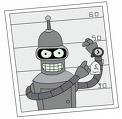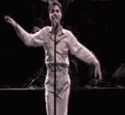|
el Trentoro posted:I think a well-kept secret is that, on pretty much any instrument, the players of average to above average fluency still don't sight-read like crazy. Well, sight reading and playing without looking at your hands aren't the same thing. Even when I have something memorized I very rarely look at my hands these days; in fact, I find sometimes that looking at my hands is a distraction. But in some situations, like a very awkward chord or a huge leap or something, I do look. Sight reading is like anything else, it takes practice. I spent three years in high school being the accompianist for our school chorus, and I can't count the number of times I had to sight read something totally cold (in front of all my friends and 90 strangers to boot) (and once I had to do it on stage, but I'd rather not talk about that incident). You get better at it. Thing is, you can only really cold sight read a piece ONCE so it's hard to practice it without a huge volume of stuff. wlokos posted:
Early Mozart sonatas, maybe? That's what I started out with. Which Shumann pieces did you get? He has a whole set of pieces for "the young" that are pretty good for what you're talking about.
|
|
|
|

|
| # ? May 16, 2024 06:04 |
|
Yeah, I'm reasonably sure that it's the set of pieces for the young. I can kinda do them (well, the first one that I've been working on), but it's taking a long time because it's a bit of a stretch for where I'm at. I wish I could find some recordings of the songs too, but I wasn't able to via google.
|
|
|
|
Arashikage posted:I've been dropping by the piano place like four times now on my way home to try out a few digital pianos to see how they grow on me before I finally by one. Both quality DPs for beginners. Go with your gut feeling. Don't assume that extra heavy means extra realistic, a lot of proper pianos aren't that heavy in the keys at all, it's more to do with the feel and expressiveness of hammers and whatnot.
|
|
|
|
Vanmani posted:Both quality DPs for beginners. Go with your gut feeling. Don't assume that extra heavy means extra realistic, a lot of proper pianos aren't that heavy in the keys at all, it's more to do with the feel and expressiveness of hammers and whatnot. Cool, thanks. Does anyone have any recommendations for a good and not insanely expensive set of headphones suitable for DP use?
|
|
|
|
Arashikage posted:Does anyone have any recommendations for a good and not insanely expensive set of headphones suitable for DP use? I'd also like headphone recommendations, and also anyone's thoughts on the Casio PX-320 for a complete beginner. edit: alternatively should I just purchase a PX-120 considering I have to pay a $250 surcharge for overseas shipping + taxes a slime fucked around with this message at 01:34 on Feb 22, 2009 |
|
|
|
My piano professor told me something that made a lot of sense when she sight read a piece I had been working on for months and played it almost performance level and speed. Reading a score is like reading a book. When you were 4 years old, you needed to sound out words and think about it. You made mistakes. But obviously as you worked to read better it got easier and eventually you could just read very easily and quickly without too much effort. Reading and playing a score is the same thing. Instead of making the sounds with your mouth, you're doing it with your fingers. It's just most people don't practice sight reading a score as much as they did learning to read. Does that make sense to anyone else? It blew my mind when we were talking about it.
|
|
|
|
Sure that makes plenty of sense. The only real complication is that with Piano you often have to read 2 words at the same time. Sight reading on monophonic instruments is so amazingly easier. I really should practice my reading more, but I'm a writer not a session musician so it's rather hard to find the motivation.
|
|
|
|
How difficult might it be for me to go from playing 4 malleted keyboard instruments to a 10 fingered keyboard? I mean, I think have a good head start, I'm reading multiple notes at the same time, recognizing chords and keys, but will this really help me if I decide to try piano?
|
|
|
|
I took up guitar about a year and a half ago after having played Piano for around 13 years. I had a massssssive headstart, because I already understood the finer details of music, so all I really had to learn (and still am learning I guess) is techniques specific to the guitar. Your situation should be much the same, you know how to read your sheet music, and you have experience with various rhythms and melodies. You understand what a note is, what a semitone is, what a tone is, what a chord is yada yada yada. All you need to do to learn the Piano is learn the specifics of using your fingers (and feet) to actuate piano mechanisms appropriately. So yes, you will have a good start, and will likely appear to learn substantially quicker than someone without a pre-existing music background. In your specific example probably more so than most.
|
|
|
|
Roumba posted:How difficult might it be for me to go from playing 4 malleted keyboard instruments to a 10 fingered keyboard? I mean, I think have a good head start, I'm reading multiple notes at the same time, recognizing chords and keys, but will this really help me if I decide to try piano? Obviously any musical background helps loads when learning a new instrument. It's basically just going to help you with reading and understanding the instrument. You may have a leg up with being able to seperate what the hands do, but that's about it. You generally won't really have much additional technique that someone that hasn't touched an instrument has, I'd presume. But yeah, it definitely will help you.
|
|
|
|
Alizee posted:Reading a score is like reading a book. When you were 4 years old, you needed to sound out words and think about it. You made mistakes. But obviously as you worked to read better it got easier and eventually you could just read very easily and quickly without too much effort. My instructor gave me similar insight. Forgive the simpleness in my example, I'm still very much a beginner. Consider the notes as letters and chords as words. When you first start out reading as a child, you have to pronounce each letter. (Sesame Street: B - A - G / B - A - G / B - A-G / B-AG / BAG.) Eventually, you can simply read the word 'BAG' as a single unit, with little regard to the individual letters. (Hlel, you can eevn jublme the ltetrs and the wrods are redaable.) Same goes for notes. Initially, if you see a 'C-E-G' note progression, you see it as three notes. However, the 'word' would be a C Chord. Eventually, you can recognize the notes as part of the C chord. Another shortcut that can speed up sight reading is being able to recognize intervals. This is especially useful when multiple notes are on the same stem. You'll only have to read and recognize the bottom note, and the top note is simply a 3rd, 4th, or whatever above it.
|
|
|
|
Underdog posted:Another shortcut that can speed up sight reading is being able to recognize intervals. This is especially useful when multiple notes are on the same stem. You'll only have to read and recognize the bottom note, and the top note is simply a 3rd, 4th, or whatever above it. I'm not a very good sight reader, but the intervals is pretty much it for me. You know what key you're in, you read the root, and then you can very easily see from the intervals what the next note is, without implicitly reading the next note. Occasionally this falls apart when the interval is >1 octave but with a little practice it's generally sufficient... assuming you are intimately aware of the current key and can see the keyboard in those terms.
|
|
|
|
I can use some advice. I've been playing for a bit under a year, and currently have a Casio PX-200. The action is OK, but the sound quality has started to holding me back. So I've decided to upgrade. Since I'm apartment bound, an acoustic isn't an option right now. I'm seriously considering a Roland HP-207 and the Yamaha CLP-340, but I'm not 100% convinced about spending $2,500-$3,400 for a high-tier digital. So I've been thinking about a cheaper option where I plug my keyboard into my computer and then get something like Synthology Ivory or Pianoteq. I'm still trying to figure out what I need - does this look correct to you guys? - USB Audio Interface (M-Audio Fast Track Pro - $200) - Synthology Ivory ($320) or Pianoteq ($280) - Midi and cable for speaker For speakers, I don't want to spend more then $800 for a solution (unless there is a compelling reason). What are your thoughts on these, or is there something else I should look at? - Behringer Truth Active 2 Way Monitor ($360 / pair) - Roland KC350 Amp ($495) Thanks!
|
|
|
|
Synthogy Ivory sounds pretty amazing, it's massively hard work on your poor computer though so playing it in real time is not always an option. There's other decent sample based piano libraries that don't tax your computer so much (still need a couple of gigs of RAM though), Art Vista is ok sounding for example, Reason Pianos can sound ok. Then there's Pianoteq (as you mentioned) which is a digitally modelled piano and as near as I can tell from the demos on the website sounds great (and since it's modelled is INSANELY TWEAKABLE which excites me a lot). I haven't tried it, but I will definitely grab a copy and muck around with it one day soon. The obvious advantage to Pianoteq is that it weighs in at only 20Mb and although it probably takes a bit of CPU power it won't be anything like as bad as those multiple gigabyte sample based monstrosities. An audio interface is a good idea to enable low latency, but if you have a decent quality soundcard that supports ASIO that will be sufficient too. Anything that supports ASIO should do alright for MIDI controllers (just using any old $20 MIDI to USB cable), you don't really need to spend $200 on a half decent 2 channel audio interface just for MIDI. If you wanna pick up a microphone and start recording vocals and stuff, go for it. You do want to have decent speakers running off your computer and wired into a decent stereo position around your keyboard though. Any kind of active monitors will do a good job, or a keyboard amp is alright, but it's mono (great for gigging though, of course). Someone was pimping some studio monitors that were on special in guitar centre the other day which would probably be a better option than the Behringers. In my mind buying a digital piano with built in speakers is never a good idea for anyone who has the technical capabilities to make a more versatile (and almost inevitably better quality) stage piano/midi controller and amplified speaker setup work. The obvious advantage to playing via MIDI is that you aren't limited to Piano. You can pull up a DAW and a host of softsynths and other such wonderful goodies and go to town making whatever you want.
|
|
|
|
Looking for quality online sources on Jazz improvisation, chord structure, etc. The more detailed the better; I'm an accomplished classical pianist, understand theory at the college level, and have a really good ear. I'm just at a loss for how to expand outside of working with blues/pentatonics. I realize most of what needs to be learned can also be learned through listening to audio recordings; so any influential albums/tunes/artists I can rip off from would also be helpful.
|
|
|
|
Vanmani posted:An audio interface is a good idea to enable low latency, but if you have a decent quality soundcard that supports ASIO that will be sufficient too. Anything that supports ASIO should do alright for MIDI controllers (just using any old $20 MIDI to USB cable), you don't really need to spend $200 on a half decent 2 channel audio interface just for MIDI. If you wanna pick up a microphone and start recording vocals and stuff, go for it. You do want to have decent speakers running off your computer and wired into a decent stereo position around your keyboard though. Any kind of active monitors will do a good job, or a keyboard amp is alright, but it's mono (great for gigging though, of course). Someone was pimping some studio monitors that were on special in guitar centre the other day which would probably be a better option than the Behringers. Sorry for the delay in response; I had to go out of town. Your advice has been really helpful, so thanks. I never thought about using my sound card, but that does seem like a good way to save $200 short term. I still need to check out the Roland HP-207, but unless it has a built in beer tap it's unlikely I'll buy it. Currently, I'm leaning towards Pianoteq vs Ivory. Does it sound as good as Ivory? Not really. However, the fact that Pianoteq can emulate so many different characteristics of an acoustic is a huge plus. Simply put, it seems like the better learning tool, even if it's not the better professional recording tool. Since gigging isn't in my near future, I'll look into monitors. I'll check around and see what other suggestions I can find for my price point.
|
|
|
|
I've been thinking about learning to play the piano for a while now. I'm 31 and I have no experience in music whatsoever. There's no way in hell I can fit a "real" piano in my house, so it'll have to be a digital one. As for learning to play: I'm pretty sure I want lessons. I've looked at regular classes, which would be the cheapest option. Apart from piano practice, I would have to follow some theory classes as well. I don't mind those that much, except that from the description it seems that I'd have to sing too, which is something I really really don't want to do. Also, the piano practice sessions are in small groups, which is probably not as good as private lessons. The other option is private lessons. They're probably better - if I can find a good teacher - but more expensive as well. Right now I'm leaning towards getting a private teacher. It's probably more flexible too, as I can probably "enroll" whenever, unlike an official school where I'll have to wait 6 more months. Now what I'm really unsure about is if I'll like it enough to actually practice and play. And until I know, I'm hesitating to spend a lot. I'm looking at a DGX-630, but that's 800€, which is a bit risky if I don't know I'll stick with it. So, is there anything in the range of about 100€ that I could practice on for a few months, while I find out if I like playing enough to get something better?
|
|
|
|
uXs posted:lessons? Just get private lessons. There's really no substitute for them - private lessons with a good teacher will help you get much better much faster than ANY other method. Private lessons + practice time = you'll be amazed at how fast you improve. Make sure that you find someone who's good, though, don't just pick a random name from the local music shop's list of teachers and start giving them your money when they might be an awful teacher.
|
|
|
|
So how should I find a teacher? Any other sources of teachers besides local music shops and the internet? (I'm in Belgium, so US-specific hints are fairly useless.) And when I find someone, who do I know he or she is any good? I suppose I can check references or experience (although I'm not sure I can differentiate between good and bad refs and exp), anything else?
|
|
|
|
uXs posted:So how should I find a teacher? Any other sources of teachers besides local music shops and the internet? A good teacher at your level is someone who genuinely knows their stuff and you can get along with well. Just make sure they have a real education themselves (University level or have reached a high grade in piano). If you're concerned about getting qualifications you'll need to make sure they can teach you in line with what your local examiners want, if you're not concerned about that you pick a teacher that knows how to teach the style you want to play. At some point it's possible you'll outgrow your teacher, but at that point you'll know where to go. For 100E you're looking at a second hand Yamaha something, probably. If you're interested in PIANO you might try to find a second hand Yamaha DGX-620 or similar for a good price. It'll sound tolerable enough and give you a more or less full size "weighted" keyboard and you can figure out if you like it from there. If you do, you'll want to buy yourself a better piece of kit after a couple years, but something like that will be good for a while. You've got a fair chance with second hand at those prices, because a lot of parents buy them as toys for their children trying to encourage them to learn, but when the kids decide computer games are more fun they sell 'em off to fund the next purchase. Oh, and as far as singing goes... only singing I ever had to do in piano lessons was for exams. I presume they wanted to test whether you were just playing the music, or if you could actually hear it as well, so they asked you to reproduce notes that they played on the piano with your voice. A crude test of ear. Vanmani fucked around with this message at 00:47 on Apr 14, 2009 |
|
|
|
Vanmani posted:For 100E you're looking at a second hand Yamaha something, probably. If you're interested in PIANO you might try to find a second hand Yamaha DGX-620 or similar for a good price. It'll sound tolerable enough and give you a more or less full size "weighted" keyboard and you can figure out if you like it from there. If you do, you'll want to buy yourself a better piece of kit after a couple years, but something like that will be good for a while. I'm thinking of buying a Yamaha DGX-220 for about 175€. The plan is to use that for 3 or 4 months while I figure out if I actually like playing. And if I do, I'll get something better then. Good plan, or is 175€ too expensive? (Price for a new one was 470€, keeping in mind that the 220 is last year's model.) I really have no clue how quickly these things depreciate. Edit: never mind, some jerk bid more than me. uXs fucked around with this message at 12:57 on Apr 18, 2009 |
|
|
|
Could anybody recommend me some easy jazz arrangements for solo piano? It'd be cool to learn a few of those, but I'm not good enough at piano to just open up the Real Book and throw the chords and melody together into something coherent.
|
|
|
|
Hey all, I've been playing piano for most my life. It's never really been my voice, so I haven't played much over the past few years, although I'm still studying music in other areas. I really would like to develop my technique; every teacher I've had at music colleges and community colleges gives me poo poo about my technique, but I think I'm ready to embrace it. Does anyone have any drills, or books, or any advice about technique? My teachers would all give me this drill to play one note at a time, with each finger. I know that doesn't describe it well, sorry, but it's been a while and I don't remember very well. Perhaps someone here could explain to me how to do it/the purpose. I'm willing to do most anything at this point. I guess I was discouraged at the time, for someone who can play some Rachmaninoff to be told to play one note at a time, on every finger, 5 notes up and 5 notes down, very slowly... well my ego got in the way. So yeah, any technique advice for piano? Any websites/videos? Anything? TIA all
|
|
|
|
I took piano lessons for about 10 years, won all sorts of trophies and crap at some piano festival here in Charlotte. Then I just stopped. So after about 13 years of not playing my piano, it's delivery has been scheduled and it will be rescued from my grandmother's house. I probably can't do anything other than play the scales from Solfeggietto. Anybody else take this step before? How did you get going again? Just pick up some random music and go to town?
|
|
|
|
crm posted:I took piano lessons for about 10 years, won all sorts of trophies and crap at some piano festival here in Charlotte. Then I just stopped. Yea, I had similar experience. Played pretty serious for most of my childhood, and then stopped and concentrated on other instruments. 15 years after I quit, I picked it up again by playing through some standard repertoire (Bach Inventions, some Mozart Sonatas, as well as some easier Chopin). Everything came back fairly quickly. I learned that: - Whereas I used to breeze through Mozart as a kid, some of the same pieces gave me difficulty as an adult. I still have trouble with doing a good alberti bass, which is kind of embarrassing. - Opposite experience with romantic/contemporary stuff. Debussy, Chopin, Ravel, and other contemporary composers were surprisingly easy to learn, despite remembering them as being very difficult when I was a kid. Also, it's very hard for me to relax my fingers as an adult. This requires a lot of focus. I did take some lessons and that helped.
|
|
|
|
The only instrument I've played since is the PC, unfortunately. Aside from playing a few notes A Bit of Soul when I walk by a keyboard, I've got nothing. No idea where all my sheet music is. It was all pre-internet - where can I get snazzy music from nowadays? I found 8notes.com, but wouldn't mind some more contemporary stuff. For some reason I really want to play the old NBA on NBC theme John Tesh did. ... what is wrong with me?
|
|
|
|
8vb means play an octave lower. What does it mean when there is just (8)? And if it means to play the normal octave, why put anything there? Said piece in question:  Click here for the full 1067x517 image.
|
|
|
|
Those are not two separate lines. The 8vb line began on the first system and continues onto the second. The (8) is there to remind you what that line is, just in case that second system wound up on a separate page or something. So did a classmate make that in sibelius for you to play, or something?
|
|
|
|
No it's a Regina Spektor song off the internets, though likely transposed in that program.
|
|
|
|
Oh well I bet the person engraved it in sibelius, it looks like the default font and I know sibelius does those kinds of things with the lines. Which song is it?
|
|
|
|
"Better." There's a yahoo group called regispek that has a lot of her sheets posted.
|
|
|
|
crm posted:I took piano lessons for about 10 years, won all sorts of trophies and crap at some piano festival here in Charlotte. Then I just stopped. I'm in the same situation. I haven't played in years, but recently I picked up the only piece of sheet music I still had (Rachmaninov's C# minor) and just tried playing again. I was surprised how much muscle memory I still had and it came back. I bought a sheet music book of Mussgorsky stuff and one of some Scriaban stuff (way way waaaay over my skill level) and just started trying to play them again. I didn't really pay attention to the music when I was taking lessons (wish I had), and I don't really know any music. This is going to sound dumb, but are there any composers who did really epic dramatic sounding stuff like they use in a lot of Japanese video games, with the huge arpeggios and runs and such?
|
|
|
|
Zyklon B Zombie posted:This is going to sound dumb, but are there any composers who did really epic dramatic sounding stuff like they use in a lot of Japanese video games, with the huge arpeggios and runs and such? I'm not to familiar with the video games but from your description, the earlier Beethoven piano sonatas come to mind as something that might be well-suited for you.
|
|
|
|
Any particular ones I should be looking at? I feel dumb as hell and am completely confused at digging through his work numbers.  And I found the perfect example of what I'm trying to find. Are there any composers who did anything in this vein: http://www.youtube.com/watch?v=xfEVr1HpSVw It's just so massive and big sounding to me.
|
|
|
|
They're a rock band so maybe it's not what you're after, but look into Muse if you haven't heard them already. They do a sort of furious alt-rock version of Rachmaninov: http://www.youtube.com/watch?v=ZrgnuyDHqns
|
|
|
|
How does one learn to improvise? I've been playing classical piano for over ten years and can only read sheet music. If someone tells me to go play the piano all I can do is replay something that I've memorized. Kinda sad really. I have basic knowledge of scales and chords. Not really a good understanding of chord progressions though. Any online resources to learning how to improvise? Is a jazz foundation the best place to start?
|
|
|
|
kweesatzZ posted:How does one learn to improvise? I've been playing classical piano for over ten years and can only read sheet music. If someone tells me to go play the piano all I can do is replay something that I've memorized. Just sit down, with noone around but you. Pick a key to play in, one that you generally like. Work out a progression in that key that sounds alright with your left hand, to start with just keep it simple like playing octaves or fifths. Use your right hand to play, again within the same key. Figure out some nice melodies that work over your progression. Congratulations you are well on the way to becoming an improvisational pianist. Feel free to read all the books in the world, as you will never stop learning more ways to spice it up... but mostly it all comes down to an endless amount of trial and error. Your hands will end up learning what works and what doesn't... and your brain will get used to the idea of improvisation. It's important that you just be able to go for it without faltering, losing your rhythm will ruin the flow. If you play something that sounds poo poo then take a note not to do it again in your head, but don't stop... just keep grooving.
|
|
|
|
Hey guys. Not really a new musician, nor exactly new to the piano. The problem is that for the past few years I've only been using it as a tool for theory homework, which was also a while ago, and writing. I just need some piano boot camp to get back into the swing of things. All my good sheet music and piano books are with my parents about 200 miles away along with the upright I learned on. I'm here with a a cheapo 88 key keyboard and a book of Haydn Sonatas, heavily scrawled in from classes. I'd like to work back up to that but for the short term I'd say I'd like to shoot for somewhere between the "Coldplay" (but god do i loathe them) and "Jazz" options. Get me back to a place where I can stand again, so to speak. Almost 6 years of ignoring my piano playing in favor of other instruments and regarding my keyboard as a tool has seriously atrophied me. I'd like to get a teacher and get some good brush up lessons and exercises but my schedule just doesn't allow it at the moment. I have time enough to practice but they are odd hours of night and morning. Basically, I'm pounding out some chords by ear to random songs and practicing scales, but I think something more than that is going to be needed to get me back into shape. Any advice?
|
|
|
|
STOP MAKING SENSE posted:I'd like to get a teacher and get some good brush up lessons and exercises but my schedule just doesn't allow it at the moment. I have time enough to practice but they are odd hours of night and morning. Basically, I'm pounding out some chords by ear to random songs and practicing scales, but I think something more than that is going to be needed to get me back into shape. Any advice? If I were you I'd get two pieces which you would consider reasonably easy (but not boringly so) and give yourself a week or two to master them. Preferably songs that you've always wanted to learn but never found the time for. Maybe you like Ben Folds, or Elton John or Billy Joel or Bach or Mozart or Muse or whatever. Any songs you really quite like and feel motivated to learn. Not songs that you are being told to learn. Set yourself a strict deadline for mastering them, but one that is reasonable and you are confident you can manage if you put in the available time. That'll get your head back in the right space pretty quickly I reckon. To inspire you, I posted these in the other Piano thread. All of the endorsed sheet music for Muse. Many fun songs of varying difficulties in there. In order of difficulty it would probably range from New Born to Bliss to Sunburn to Feeling Good to Apocalypse Please to Endlessly to Space Dementia. There's a whole bunch of others that I haven't played, so I'll leave off judging their difficulties. http://www.microcuts.net/uk/tabs
|
|
|
|

|
| # ? May 16, 2024 06:04 |
|
I just purchased a Yamaha CP33 as my first foray into the world of Piano. Hopefully I stick with it, I'll let you all know.
|
|
|





















